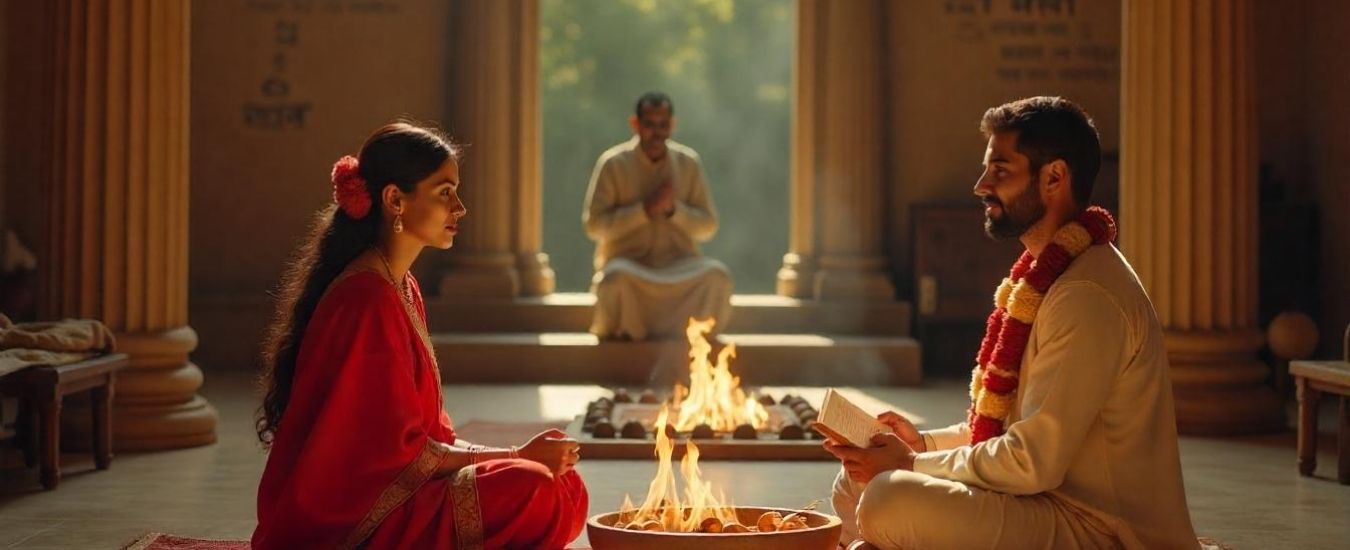When you think of a wedding in India, images of grand mandaps, overflowing buffets, and lavish outfits come to mind. But not everyone wants—or can afford—that. Enter Arya Samaj marriages, where the focus shifts from extravagance to essence. If you’re looking for a simple, meaningful, and legally recognized Vedic marriage system, Arya Samaj might be your best bet.
In a world driven by social media and wedding planners, Arya Samaj’s marriage brings you back to basics: love, commitment, and legality. Whether you’re from different backgrounds or just value simplicity, this spiritually rich and legally binding alternative might be exactly what you’re looking for.
But what exactly is an Arya Samaj marriage? How is it different from court marriage or traditional Hindu rites? What are the rules, rituals, and paperwork involved?
Don’t worry—we have got it all covered in this guide.
What is Arya Samaj?
Arya Samaj, founded by Swami Dayananda Saraswati in 1875, is a Hindu reform movement. It emphasizes Vedic values, rejects idol worship, and promotes equality across castes and communities.
The marriage rituals performed under Arya Samaj Sansthan follow Vedic mantras, making them sacred and legally valid under Indian law.
Why Arya Samaj Marriages Are Gaining Popularity
- They’re simple and budget-friendly.
- They support inter-caste and inter-religious unions (as long as one partner is Hindu).
- The process is quick, legal, and minimalistic—perfect for today’s couples who want to skip the drama.
Legal Recognition of Arya Samaj Marriages – Validity Under the Hindu Marriage Act, 1955
Arya Samaj marriages are recognized under the Hindu Marriage Act of 1955, which applies to the following:
- Hindus
- Sikhs
- Jains
- Buddhists
If one partner is from another religion (like Christianity or Islam), they can convert via Shuddhi Karma and obtain a conversion certificate to make the marriage valid.
Is Arya Samaj Marriage Legally Binding?
Yes, absolutely. Once the ceremony is done, the couple receives a marriage certificate. This is fully valid and accepted for all legal purposes—passport, visa, property rights, and more.
Who Can Get Married in Arya Samaj?
Eligibility Criteria
To tie the knot under Arya Samaj:
- The bride must be 18 years or older.
- The groom must be 21 years or older.
- Both should be of sound mind and give free consent.
Inter-Caste or Inter-Religion Marriages?
Yes! That’s one of the biggest advantages.
- Inter-caste marriages? Totally okay.
- Inter-religion marriages? Allowed if one converts to Hinduism through Arya Samaj rites.
Pre-Marriage Requirements – Necessary Documents
You’ll need:
- Age proof (Birth certificate, Passport, or 10th mark sheet)
- Address proof (Aadhar card, Voter ID, Passport)
- Passport-sized photos
- Affidavit declaring marital status and age (use correct affidavit format)
- Two witnesses with valid ID proofs
Additional documents:
- Divorce decree or death certificate (if applicable)
Registration Process and Timeframe
The solemnization usually takes 2–3 hours. After the Vedic rituals, you receive a marriage certificate from Arya Samaj, which can be used at the marriage registrar’s office for registration under the Special Marriage Act.
The Ceremony: Step-by-Step Rituals – Simplicity Over Showbiz
Arya Samaj weddings prioritize spiritual connection over pomp. The setup is clean and serene.
Rituals Include:
- Vedic Chanting and Havan (sacred fire ceremony)
- Exchange of Garlands (Jaimala)
- Saptapadi (Seven vows around the fire)
- The final pronouncement by the Arya Samaj Pandit
Key Differences from Traditional Hindu Marriages
- No Idol Worship
- Emphasis on scripture-based rituals
- Eco-conscious and cost-effective
- Legally equivalent to civil marriage or court marriage
Advantages of Arya Samaj Marriage
- Low-cost (₹5,000–₹10,000)
- Perfect for love marriages and inter-caste unions
- Instant marriage proof and certificate
- Less bureaucracy compared to other forms of legal marriage
Things to Keep in Mind
- Visit only government-recognized Arya Samaj Mandirs
- Always register at the civil marriage registration office post-ceremony
- Verify if the certificate is issued on Arya Samaj letterhead
For Foreign Nationals
Documents Required:
- No Objection Certificate (NOC) from the embassy
- Valid visa and passport
- Proof of age and single status
Legal Notes
The NOC ensures Indian authorities that the foreign national is free to marry under local laws.
How to Choose a Trusted Arya Samaj Mandir?
- Look for licensed Arya Samaj centres
- Check for registration numbers and online reviews
- Ask for a sample of the certificate format in advance
Myths vs. Reality
| Myth | Reality |
| It’s not legally valid | 100% valid under the Hindu Marriage Act |
| Only Hindus can marry | Inter-religion allowed with conversion certificate |
| It’s a poor man’s wedding | It’s a conscious minimalist choice |
| It lacks rituals | Includes rich Vedic chanting, Havan, and Saptapadi |
State-Wise Popularity
Arya Samaj Marriages are common in the following:
- Delhi NCR
- Maharashtra (Mumbai, Pune)
- Gujarat (Ahmedabad, Vadodara)
- UP, Rajasthan, Haryana due to cultural affinity
FAQs
Can I marry without parents’ consent in Arya Samaj?
Yes, as long as both partners are above the legal age and mentally sound, parental consent is not mandatory.
Is Arya Samaj marriage accepted for passport and visa?
Yes, the Arya Samaj marriage certificate is legally valid and accepted for official documentation like passport and visa.
How long does the ceremony take?
Typically, the entire ceremony, including paperwork, takes 2 to 3 hours.
What language is the ceremony conducted in?
The rituals are performed in Sanskrit, but explanations are provided in the local language or English upon request.
Do we need witnesses?
Yes, usually two witnesses (friends or family members with ID proofs) are required during the ceremony.
